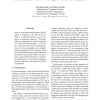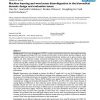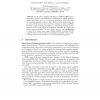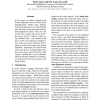54 search results - page 2 / 11 » Supervised Domain Adaption for WSD |
ACL
2007
13 years 6 months ago
2007
When a word sense disambiguation (WSD) system is trained on one domain but applied to a different domain, a drop in accuracy is frequently observed. This highlights the importance...
BMCBI
2006
13 years 4 months ago
2006
Background: Word sense disambiguation (WSD) is critical in the biomedical domain for improving the precision of natural language processing (NLP), text mining, and information ret...
CORR
2000
Springer
13 years 4 months ago
2000
Springer
In this paper Schapire and Singer's AdaBoost.MH boosting algorithm is applied to the Word Sense Disambiguation (WSD) problem. Initial experiments on a set of 15 selected polys...
ACL
2003
13 years 6 months ago
2003
A central problem of word sense disambiguation (WSD) is the lack of manually sense-tagged data required for supervised learning. In this paper, we evaluate an approach to automati...
COLING
2008
13 years 6 months ago
2008
In this paper we explore robustness and domain adaptation issues for Word Sense Disambiguation (WSD) using Singular Value Decomposition (SVD) and unlabeled data. We focus on the s...




